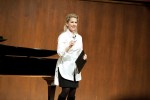Column Name
Title
Juilliard’s China Cachet
Who says Juilliard isn’t a rock-star school? At the end of October, President Joseph W. Polisi went to China to be part of the gala 75th anniversary celebration of the Central Conservatory in Beijing. As part of the festivities, attended by a who’s who of international conservatory leaders, Polisi gave a keynote speech and was named an Honorary Fellow. When the student tour guide assigned to the Juilliard contingent learned where they were from, he promptly asked Polisi to sign his hoodie. Before long, dozens of his classmates had crowded around to take photos and ask for autographs. The Juilliard name carries a lot of cachet in China, it was clear.
Body
Part of that palpable excitement was because of Juilliard’s reputation, of course, and much of it was because The Tianjin Juilliard School is ever closer to becoming a reality. The Juilliard team also traveled from Beijing (only 45 minutes by high-speed rail) to the bustling city of Tianjin to check out the progress on the business district of Yujiapu, which will be the home of the new campus.
DiDonato Returns for Master Class
The live-streamed master class series continues when mezzo- soprano Joyce DiDonato stops by Juilliard before reprising her star turn as Elena in the Metropolitan Opera’s La donna del lago. In her master class (December 10), DiDonato will work with soprano Christine Price on Mozart’s “Ach, ich liebte” and Puccini’s “Chi il bel sogno di Doretta”; mezzo Samantha Hankey on Massenet’s “Allez, laissez-moi seul...” and Mozart’s “È amore un ladroncello”; and baritone Theo Hoffman on Monteverdi’s “Dormo ancora” and Leoncavallo’s “Silvio’s excerpt.” All three singers will perform with pianist Will Kelley. The master class will continue with countertenor Jakub Józef Orliński and pianist Michał Biel performing Handel’s “Agitato da fiere tempeste” and Vivaldi’s “Vedro con mio diletto.” The season continues this spring when the English Concert’s Harry Bicket works with Historical Performance students (March 14), Metropolitan Opera conductor Fabio Luisi works with singers (March 18), and cello faculty member David Finckel works with chamber music groups (March 21). All of the classes take place at 4pm and will be accessible at live.juilliard.edu.
Songfest Showcases Liszt
Franz Liszt is revered as one of the most virtuosic pianists of all time and classical music lore tells us that the exuberant performer was not given to sharing the spotlight. Fittingly, the fifth annual Juilliard Songfest, on December 3, features a program of lieder all by Liszt. The Hungarian composer set almost 100 song texts during his lifetime, though as Brian Zeger (MM ’80, piano), artistic director of the Marcus Institute for Vocal Arts, acknowledges in his program note, these lieder are not considered canonical as are those of Schubert, Schumann, and Wolf. This is probably due in greater part to the controversial climate in which Liszt was writing—with its raging War of the Romantics, which pitted the progressive Liszt and Wagner against the more conservative Mendelssohn and Brahms—than to a lack of quality in the compositions. In a letter to the German music critic Franz Brendel (who enthusiastically promoted Liszt in the magazine Neue Zeitschrift), Liszt touted the excitement that broke out over some of his songs, which he had shrewdly programmed as posthumous lieder of Schubert—a hoax he encouraged his singers to keep up!
Zeger will accompany sopranos Rebecca Farley and Alexandra Razskazoff, mezzo Avery Amereau, and tenor Gerard Schneider in the all-German program that, as curator, Zeger has grouped into three sections inspired by his reading of Liszt’s letters. The first section, “Landscapes,” will introduce listeners to Liszt the traveler, who toured extensively as a performer. “Looking Inward” offers a more contemplative perspective—Liszt’s 20-year-old son died in 1859 followed by his 26-year-old daughter in 1862, prompting Liszt’s retreat to a monastery outside Rome and ordination in 1865. Finally, “Love” showcases Liszt, the quintessential Romantic
—Joshua Simka (BM ’14, voice), Editorial Assistant
Community Engagement Grants
The program formerly known as Summer Grants has a new name, Community Engagement Grants—and proposals are due February 1. These grants have assisted students from every division and helped them to engage in worthy outreach and service-based projects locally, nationally, and internationally. Grants have been awarded to projects that reflect concern for social responsibility as artists; supplement regular artistic studies and education; and expand the students’ professional versatility. Students who are applying for this year’s Community Engagement Grants should make sure their proposals include community outreach and engagement components (i.e., arts education, social and/or arts programming and interaction, etc., particularly with a community or group in need of assistance). Proposals should also incorporate a plan for long-term relationship and/or remote follow-up as needed as well as a collaborative action plan. All current, full-time enrolled College Division undergraduate and graduate students, including those graduating in May 2016, are eligible to receive Community Engagement Grants, though preference will be given to students who will be returning to Juilliard in the fall of 2016. The deadline to submit grant proposals is February 1, 2016; they can be sent to cegrants@juilliard.edu. Application information is available at the Office of Student Affairs, Room 100, and online at MyJuilliard as well as on the Juilliard website.—Sabrina Tanbara, Assistant Dean for Student Affairs






